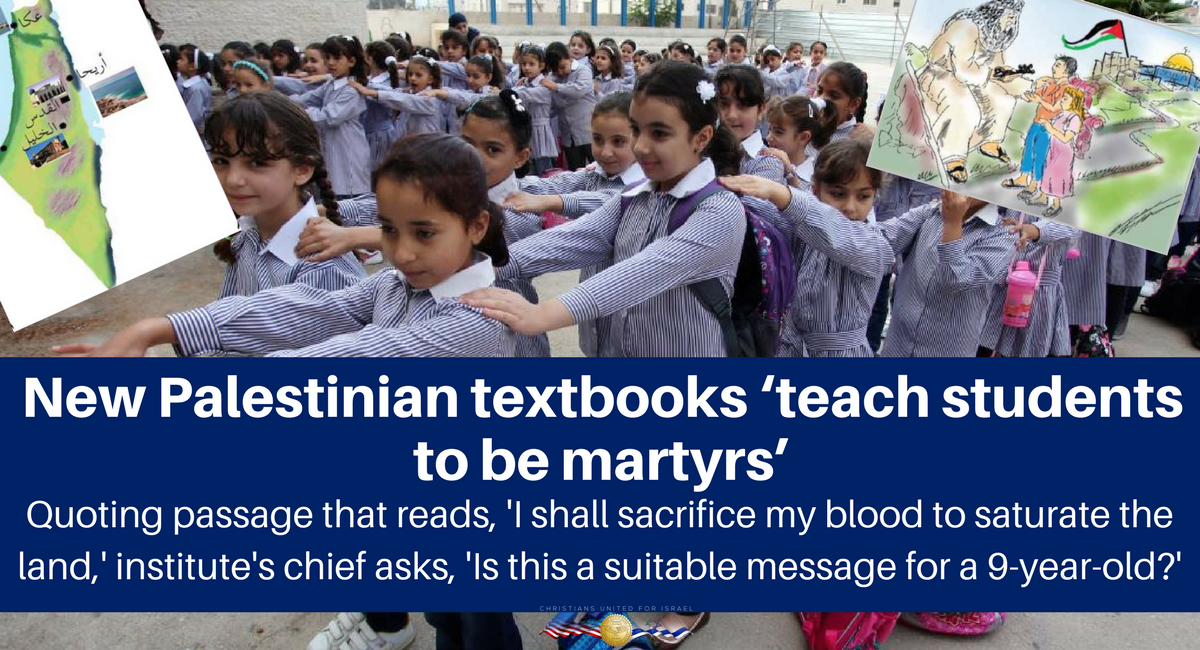New Palestinian textbooks ‘teach students to be martyrs’

The Palestinian Authority’s new textbooks for first to fourth grades demonize Israel and glorify “martyrdom,” a report published Sunday claims, citing an “alarming deterioration” since a previous study.
The report, by Hebrew University’s Institute for Monitoring Peace and Cultural Tolerance in School Education (IMPACT-se), says that the 2016-2017 elementary school curriculum in the PA “teaches students to be martyrs, demonizes and denies the existence of Israel, and focuses on a ‘return’ to an exclusively Palestinian homeland.”
The report by the Jerusalem-based group comes as Israeli officials continue to call on Palestinian officials to halt what they see as the demonization of Israel in textbooks and other materials aimed at children. They say the textbooks are a key source of incitement that drives terror attacks.
Among the textbook materials cited in the report are maps that don’t show Israel and passages that appear to glorify attackers.
The report notes that in addition to Israel not appearing on maps, Israeli cities such as Haifa and Jaffa are described as Palestinian, a frequently documented phenomenon in PA teaching materials.
Palestinian critics have noted maps in official Israeli textbooks also generally do not distinguish between the Palestinian territories and Israel proper; nor they do label Palestinian cities as such.
The report highlights what it says is a new emphasis on “martyrdom” in the schoolbooks.
To substantiate the claim, the report cites three examples, including two arithmetic questions in which martyrdom takes center stage.
“The number of martyrs of the First Intifada during 1987–93 totaled 2,026 martyrs, and the number of martyrs of the Al-Aqsa Martyrs Intifada in the year 2000 totaled 5,050 martyrs while the number of the wounded reached 49,760. How many martyrs died in the two Intifadas?” one fourth-grade textbook asks.
Palestinians generally use the term “martyr” to refer to any Palestinian killed by an Israeli, no matter the context of the death.
Another example cited by the report is an image from a fourth-grade National Education and Socialization textbook, in which children look at their classmate’s empty desk at school, bearing a placard that reads, “Martyr.”
“There is little doubt of significant — even alarming — deterioration of the curriculum’s message when compared with our review of previous texts for these age groups. In this regard, that does not bode well for future peace prospects,” the report says.
Marcus Sheff, the CEO of IMPACT-se, told The Times of Israel on Monday that the new references to martyrs in the children’s schoolbooks “place the idea of a young person being a martyr in a public light.”
It sends the message “these children are potentially expendable,” he said.
Sheff did note, however, that the new curriculum also emphasized gender equality, as well as the importance of respecting authority and the environment.
The Israeli government has long argued that incitement in Palestinian textbooks is a main contributor to hatred and terrorism against Israelis. Palestinian officials counter that draconian Israeli measures and decades of occupation, not incitement, instill hatred and inspire terrorism.
The issue has taken on increasing significance of late, as members of Congress have threatened to decrease US aid to Palestinians if incitement is not curbed.
The report, according to Sheff, was discussed in 16 meetings with lawmakers and officials in Washington, DC, in March.
The Fatah movement, which currently governs the West Bank as the Palestinian Authority, has recognized Israel’s existence since the end of the 1980s — unlike its rival Hamas, which runs the Gaza Strip. Yet, the PA has rebuffed Israeli demands that it recognize Israel as a Jewish state. Recognizing Israel’s Jewishness would mean the PA would effectively be renouncing its demand for a sweeping “right of return” that would inundate Israel with millions of descendants of Palestinian refugees.
PA President Mahmoud Abbas, who often declares he is willing to accept a Palestinian state in the Gaza Strip, the West Bank and East Jerusalem, has called numerous times for the reinstatement of a US-Israeli-Palestinian anti-incitement committee. Israel has not answered the call.
Palestinian school curricula are inspected by the international donors who finance the Palestinian Authority and, by extension, its public education system.
Tharwat Zeid, curriculum chief at the Palestinian education ministry, flatly denied the Israeli report’s accusations of incitement.
“Our books are not for inciting hatred, but for teaching,” he said.
“Historical Palestine” — the Palestinian territories and Israel — is taught to children “because it is our history and it was our land,” Zaid said.
Sheff, the IMPACT-se CEO, said “Palestinian children should absolutely be taught national identity,” but took aim at the language Palestinian children were being exposed to.
Phrases such as, “the volcano of my revenge, the longing of my blood for my land, I shall sacrifice my blood to saturate the land… are these suitable messages for a 9-year-old?” he asked.
In February, at his first White House meeting with US President Donald Trump, Prime Minister Benjamin Netanyahu said incitement was a key factor in the long-running conflict with the Palestinians.
“They continue to call for Israel’s destruction — inside their schools, inside their mosques, inside the textbooks. You have to read it to believe it,” he said.
“I think the Palestinians have to get rid of some of that hate that they’re taught from a very young age,” Trump said, responding to a reporter’s question about concessions each side needs to make.
A wide-ranging 2014 study published in Political Psychology, entitled “Portrayal of the Other in Palestinian and Israeli Schoolbooks,” claimed that “instances of dehumanization and demonization of the other” regularly alleged by each side are actually rarely found in either curriculum.
The study found that “Israeli and Palestinian books contain unilateral national narratives that present the other as the enemy.”
